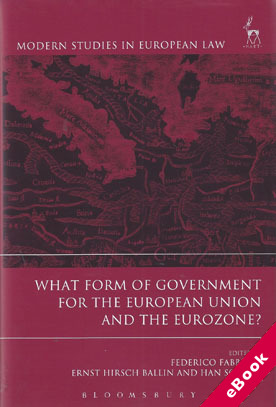
The device(s) you use to access the eBook content must be authorized with an Adobe ID before you download the product otherwise it will fail to register correctly.
For further information see https://www.wildy.com/ebook-formats
Once the order is confirmed an automated e-mail will be sent to you to allow you to download the eBook.
All eBooks are supplied firm sale and cannot be returned. If you believe there is a fault with your eBook then contact us on ebooks@wildy.com and we will help in resolving the issue. This does not affect your statutory rights.
What is the form of government of the European Union (EU)? And how is the institutional governance of the Eurozone evolving? These questions have become pressing during the last years.
On the one hand, the Euro-crisis and the legal and institutional responses to it have had major implications on the constitutional architecture of the EU and the Eurozone. On the other hand, the May 2014 elections for the European Parliament and the ensuing struggle to form the European Commission have brought to the fore new tensions in the EU political system.
The purpose of this book - which brings together the contributions of EU lawyers, comparative constitutional lawyers and political scientists, from all over Europe and the United States - is to offer a new look at the form of government of the EU and the Eurozone and consider its potential for future development.
While offering a plurality of perspectives on the form of government of the EU and the Eurozone, this book emphasizes how the Euro-crisis represents a watermark in the process of European integration, makes the case for a more legitimate and effective form of government for the EU and the Eurozone, and identifies possible windows of opportunity for future treaty reforms.
The volume will provide food for thought to scholars, policy-makers and the public at large as they continue debating about the most apt form of government for the EU and the Eurozone.